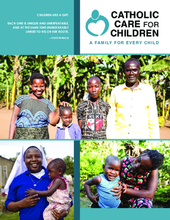Catholic Care for Children (CCC) is a visionary initiative, led by Catholic sisters, to see children growing up in safe, nurturing families. Guided by the biblical mandate to care for the most vulnerable and animated by the principles of Catholic Social Teaching—especially the dignity of each person—CCC teams are reducing the need for institutional care by encouraging and facilitating family- and community-based care for children.
CCC began in Uganda in 2016 after the government enacted legislation favoring family- and community-based care. The goal was to remedy the alarming increase in the number of children being cared for in institutions due to poverty, disability, and lack of social support. Catholic sisters and brothers ably read the signs of the times. With support from GHR Foundation, the Association of Religious in Uganda (ARU) launched Catholic Care for Children in Uganda to help the Catholic community pivot from institutional care toward family- and community-based care for children and persons with disabilities. The transition was no easy feat.
The new care model required dozens of sisters and other staff to become degreed in social work; 44 care institutions to begin record keeping and case management for residents; hundreds of stakeholders to be persuaded of the importance of family care; and thousands of families traced, reconnected with their children, and supported throughout the process. The efforts paid off. By 2020 the census of children’s and babies’ homes in Uganda declined by 75 percent, from 1,207 to 331, and four children’s homes had fully transitioned to community-based programming. Catholic sisters, drawing on their charism (spirit) of care, had emerged as leaders in childcare reform.
For Catholic sisters, the charism of care remains constant; the means of expressing it evolves. As one Ugandan sister notes, CCC is a “way of expressing our charism—what moves us to do what we do, the way we do it, the attitude we use to do it, the energy we put in. We built on that strength to ensure that this expression of charism is now combined with skills and professionalism.”

